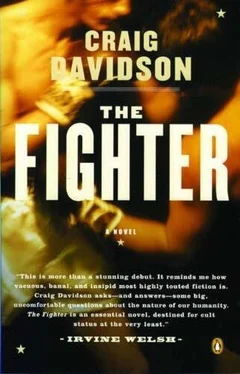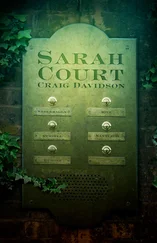He turned west on Pine Avenue, warming up, perspiration beading on his forehead and below his eyes. At the corner of Pine and Portage a wrecker’s crane sat immobile on the remnants of a pizza joint shut by the health authority. Always plenty of demolition going on: buildings torn down and rubble carted away, but nothing new ever put up. Empty lots dotted the streets and avenues, lifeless but for the profusion of weeds. It was as though a consortium of concerned citizens was buying up the neighborhood, bulldozing the homes and shops, sterilizing one block at a time in hopes that someday they might start over fresh.
Robert had a good sweat going by the time he hit Main. Running on the wet grass bordering the sidewalk, shadowboxing, flashing quick left jabs and the occasional right cross. Cars and trucks fled by on the double-lane road, people heading to work at factories or outlet malls. In the early light he made out the Rainbow Bridge as a harp of steel and concrete spanning the surging river.
He rested for a minute at the Niagara Aquarium. Ptarmigans had built nests on outcrops along the river’s sheer cliff face, cobbled together from sedge grass and foil burger jackets and neon drinking straws. Closer to the falls, on the Canadian side, a sandy inlet known as Long Point sat hemmed by spidery oak trees. Rob’s uncle Tommy said that back in 1858, steamboats filled with thugs, thieves, gunmen, and other so-called sportsmen crossed the river in the dead of night to watch John C. Heenan and John Morrissey fight for the American championship. They fought at Long Point since, ironically, boxing was banned in America at the time. Heenan — “The Sapulpa Plasterer” — the champ, suffered from a festering leg ulcer, which bellied the hopes of Morrissey and his backers. They fought bareknuckle, hands soaked in walnut juice to toughen the skin. The ring was pitched in the shifting sands and the men fought twenty-eight rounds. Morrissey flattened Heenan with an uppercut to open the twenty-ninth, knocking him cold; administering the quietus, as sportswriters of the day might’ve written. Rob’s uncle showed him an artist’s rendering of the fight: Morrissey with his wilted handlebar mustache and upraised arms, Heenan’s face like a savage tomato cradled in the arms of his seconds while spectators in stovepipe hats and dueling jackets seethed outside the ring, brandishing pistols and daggers and clubs. A Brutal Close to the Heenan-Morrissey Mill, the caption read.
Rob continued south down Main, past boarded shopfronts and dusty antique stores, peepshow theaters with opaque windows and nightclubs advertising drink all nite for one low price. The sun rose over the falls, lighting the spume; it looked like the sparkling space above fresh-poured soda.

Top Rank was located in the basement of Shaw’s Discount Furnishings. You will rarely find a ground-level boxing club: they’re always in basements and refurbished cellars, dank subterranean chambers where men gather to study the edicts of hurt. No sign above the entryway: unless you were a boxer, knew a boxer, or paused to consider the procession of sweaty men who came and went at all hours of the day, you’d have no idea of its existence.
Rob skipped lightly down the littered concrete stairs, walking beneath exposed joists and sewage pipes padded with strips of unraveling friction tape. The walls were hung with photos of famous and not-so-famous pugilists: Ali and Holmes and Liston hung beside unknown warriors Jackson Buff, Chuck “The Bayonne Bleeder” Wepner, Mushy Callahan, Chief Danny Thunderheart.
The place was quiet at this hour of morning: a few groggy boxers shuffled around the slick concrete floor. Sickles of sunlight poured through the cracked casement windows, picking up a patina of dust motes suspended in the air.
Heavybags hung like slabs of meat. A black welterweight shadowboxed in the glow of a single fluorescent tube.
Rob’s uncle Tommy was getting dressed in the change room.
A few years ago, Rob went through a phase where he’d read a ton of hard-boiled detective novels. Anytime a “goon” character was introduced — a not-so-bright kneecapper with “the rough dimensions of an icebox” — Rob pictured his uncle. But seeing as how outside of a boxing ring Tommy exhibited a docility that verged on pathological, the only true similarities were physical. The story of Tommy’s long and not particularly successful career was written all over his face: buckle-nosed and egg-eared, his left eyelid dropping from a dead nerve to give him the look of a man caught in perpetual half-wink. A face hard enough to blunt an ax, the gym bums said of it.
“Morning, lazybones.”
“Lazybones?”
Rob peeled a sweat-soaked shirt over his head to reveal a muscle-corded torso.
“You weren’t anywhere to be seen when I got up — all-nighter at the Fritz?”
“I was on a roll, Robbie. Then I pushed all my chips in on a pair of ladies when the other guy’s holding kings.” Tommy shook his head. “Gotta get your money in on ladies, am I right?”
Robert slipped into gym togs and stabbed his feet into boxing boots. A gloom fell over him, as it so often did at this time in the morning; a gloom brought about by the knowledge that while his schoolmates slept in warm beds he would soon step into the ring to get his nose bloodied and lips split, bashing away at some opponent until the bell rang.
Tommy said, “I thought maybe you would be tired, y’know, from staying out late with ole Katey-pie.”
“You know it’s not like that. We’re friends.”
“Friends, uh? That what you kids’re calling it nowadays?”
“Who’re you sparring with?” Rob said.
“Our boy wants to change the subject, I see.” Tommy finished wrapping his hands, butted his fists together, rose to the sink. “Louie Scarpella, heavyweight from Buffalo. Trainer wants to work his guy against a flatfooted grinder and thought I fit the bill. You imagine that, Robbie? He says it to my face.” Tommy rubbed his pancaked nose with a closed fist, pinched one nostril shut and blew a string of snot into the basin. “Right to my face like that.”
“So go knock his guy’s block off.”
“You know that’s not how it works. My job’s to give Scarpella a lift — raise his spirits. I knock him on his ass, his trainer holds out on my fee.”
Tommy twisted the spigot and rinsed the sink. He stared at his reflection and blinked, as if somehow surprised at the man he caught staring back. He drove a Bobcat model 13E tow-motor at the Niagara Industrial Park, a string of corrugated tin warehouses off Highway 62A. His fellow workers were fat and balding, high school heroes gone to seed. During piss breaks, standing at the long line of porcelain urinals, Tommy’s nose would wrinkle at a smell that, to him, indicated dire maladies: prostate trouble, gallstones, urinary infection, sick excretions from old bodies. It drove him to the point where he’d pissed in a Dixie cup and sniffed, making sure it wasn’t his own sickness he was smelling.
Tommy had boxed since the age of ten. He grew up in the gym. He loved every part of it: the training and roadwork, the sparring, the fight. He was getting older and his body didn’t react the way it used to. His mind told him what moves to make but his reflexes couldn’t follow through. But he trained hard and kept in fighting shape to take a match on short notice — because, hey, you just never knew.
“How many rounds you getting in?” Rob asked him.
“Five.”
Tommy wiped his fingers on his gray trunks. “Unless Scarpella punches himself out before that.”
“He that out of shape?”
“I’ll keep it light; drag it out to four, at least.”
Читать дальше













